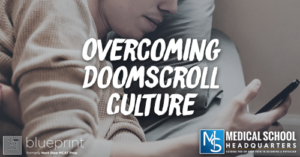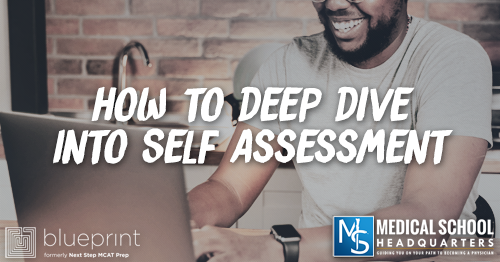Apple Podcasts | Google Podcasts
Session 339
Today, we discuss the negative impacts of social media and doom scrolling on studying for the MCAT. We talk about how spending too much time on platforms like TikTok can distract you from preparing for the important exam, decrease sleep, and affect how well information is retained.
We’re joined by Zasca from Blueprint MCAT. If you would like to follow along on YouTube, go to premed.tv.
Listen to this podcast episode with the player above, or keep reading for the highlights and takeaway points.
Navigating Social Media for Effective Study
The Pitfalls of Uncontrolled Social Media Usage
Zasca shares her personal experience of falling into the trap of using social media to relax after a long day of studying. Initially intending to spend a short time browsing, she found herself consumed by social media for hours. This then resulted in inadequate sleep and compromised learning retention.
The Dangers of Social Media Comparison
In addition to the time-wasting aspect, Zasca warns of the potential harm caused by comparing oneself to others on social media platforms. While some premed influencers may provide valuable insights and tips, consuming social media content without critical thinking can lead to detrimental consequences.
Without the full context of someone’s journey or their unique circumstances, comparing oneself to others becomes counterproductive and can hinder personal progress.
“Social media can be potentially detrimental to your studying for the MCAT… social media being a conduit for you comparing yourself to others.”
Approaching Social Media with Critical Thinking
While acknowledging the potential drawbacks, Zasca recognizes that social media can still offer valuable nuggets of information if approached critically.
By actively evaluating the content and extracting relevant insights, individuals can benefit from the experiences shared by others. However, it is crucial to consume social media mindfully and avoid falling into the trap of unfettered comparison without considering individual circumstances and study approaches.
Zasca underscores the importance of managing social media usage to ensure it complements rather than hinders academic progress. Taking control of social media habits and engaging with it in a thoughtful and critical manner can help students make the most of these platforms while safeguarding their focus and motivation.
The Illusion of Aspiration: Examining Social Media and the Reality of Content Creation
The Allure of Aesthetic Content and Social Media Algorithms
Zasca delves into the influence of visual platforms like TikTok and Instagram, highlighting how content that is aspirational and aesthetically pleasing tends to garner more attention and engagement. This preference for visually appealing content is not limited to purely entertainment-based posts but extends to educational topics like the MCAT as well.
In a world where presentation and aesthetics hold sway, it becomes challenging for content that reflects the less glamorous and more realistic aspects of studying to gain popularity.
The Disconnect between Social Media and Real-Life Experiences
Zasca discusses the inherent discrepancy between the polished personas people project on social media and the reality of their experiences.
People tend to showcase the best versions of themselves online, even when discussing educational pursuits like the MCAT. This discrepancy can lead to a sense of inadequacy or unrealistic expectations for those consuming such content.
Zasca shares her personal experience of studying in a less glamorous setting. Many others may relate to the challenges and less visually appealing aspects of preparing for the MCAT.
Navigating Advice from Content Creators
Zasca raises an important question regarding the credibility of content creators who offer advice on topics they have not yet experienced or mastered themselves. They highlight the dilemma of trusting individuals who may still be in the pre-med phase or have not taken the MCAT but present themselves as experts.
“Take all advice that you get online with a grain of salt.”
While acknowledging the value of learning from others’ perspectives, Zasca encourages critical thinking and discernment when considering advice from content creators. Rather, seek guidance from those with firsthand experience and qualifications.
Ultimately, you have to seek advice from credible sources. Navigate the online world while maintaining a realistic perspective on your own aspirations and achievements.
Navigating Costs in a Digital Age
It can be overwhelming and exhausting to navigate the information landscape, especially when it comes to seeking advice or purchasing courses. Zasca highlights the importance of being discerning consumers and considering whether the information or advice being offered can be obtained for free or at a lower cost elsewhere. Understand the intentions behind the content and whether it truly serves the consumer’s best interests.
While some services may provide valuable guidance and support, Zasca believes that information itself should generally be accessible without excessive costs. However, be sure to question and critically evaluate everything, as it can be mentally taxing.
Finding a balance between consuming information, questioning its sources, and managing the demands of studying is a challenge that many students face.
Unraveling the Information Dilemma: Balancing Cost, Intent, and Critical Thinking
At Medical School HQ, we share a similar philosophy with no blueprint when it comes to accessing information. Our belief is that information should be freely available without any barriers. However, we understand that some individuals may require additional support in implementing that information, especially when it comes to essays, interviews, and other practical aspects. That’s why we offer services to provide guidance and assistance.
While the information itself should ideally be accessible at little to no cost, we also acknowledge the practicalities involved in producing materials such as books. Factors like production costs, printing, and shipping contribute to the expenses associated with physical copies. Nevertheless, we strive to keep our resources affordable, whether it’s a Kindle book for $6 or a paperback for $10 on platforms like Amazon.
When evaluating content, it’s crucial to consider the intent behind it. Understanding whether the provider has the best interests of the consumers in mind is vital. It’s a challenging task to decipher motivations in various aspects of life, including media coverage. Questions arise, such as why certain news stories receive more attention while others go unnoticed. Sometimes, looking beyond the surface reveals that influential advertisers, like pharmaceutical companies, have sway over news networks. This dynamic can limit discussions around the pharmaceutical industry’s practices, leading to potential pushback.
“It takes a lot of mental energy to be able to sift through all the stuff that you’re getting.”
Constantly questioning and scrutinizing everything can be mentally draining. Students, in particular, face the overwhelming task of consuming, questioning, and studying a vast amount of information. Finding a balance between these demands becomes a significant challenge, often leaving individuals longing for a break from the constant mental stimulation.
Techniques for Managing Screen Time and Study Breaks
Zasca acknowledges her tendency to be an “all or nothing” person when it comes to social media usage. Recognizing that this extreme approach may not be suitable for everyone, she offers helpful insights for those seeking a more balanced approach.
For individuals with better self-control, techniques like the Pomodoro method or utilizing screen time-limiting apps can be valuable tools.
If you’re unfamiliar with the Pomodoro technique, it involves setting aside dedicated study time in manageable chunks. Typically, this entails studying for 25 to 30 minutes, followed by a short break. This pattern is repeated, culminating in a longer break after several study sessions. Breaking up study periods into smaller segments allows for more extended periods of focused learning. During these scheduled breaks, one could choose to engage with social media if desired, as long as the self-control is present.
Zasca recognizes that her personal lack of self-control prompts her to opt for temporarily deleting social media altogether. However, she emphasizes that for individuals with better restraint, implementing techniques like the Pomodoro method or using screen time-limiting apps can provide effective strategies for managing social media use while maintaining productivity and focus during study sessions.
Links:
SEARCH SITE
SEARCH SITE
LISTEN FOR FREE












